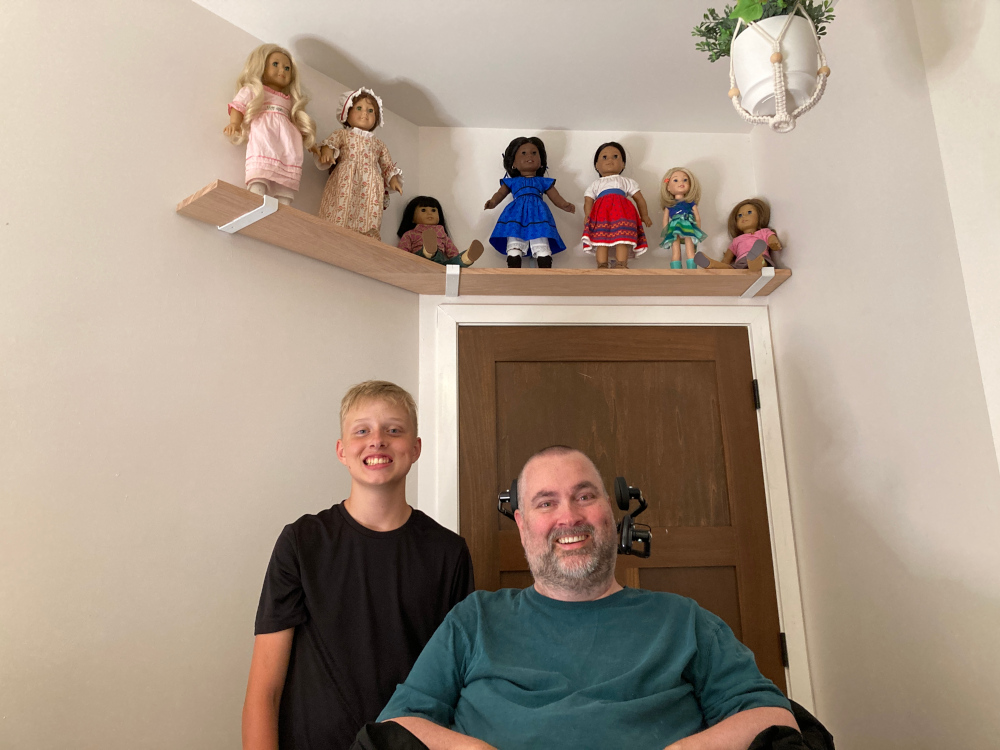How We’re Living With Purpose in Our Struggles With ALS
In their hardships, a caregiver and her husband find their reasons to push on
Written by |

This past weekend, my husband, Todd, coached our son, Isaac, in making and installing a shelf in our daughter’s bedroom. It was a corner shelf with an obtuse angle, so they had to measure the angle, cut the boards to fit, and join the two halves of the shelf together.
My daughter and I were pleased with how it turned out. I’m often impressed by what the two of them can accomplish together, since our son is only 13 and my husband has quadriplegia from his ALS.

Isaac, Todd, and the shelf Isaac built and installed, with Todd’s advice. (Photo by Kristin Neva)
Todd accepts his disabled, uncomfortable life with grace, and he finds purpose in co-parenting our two kids and providing emotional support to me. He sets an example of perseverance for our family and others.
In a recent Jordan B. Peterson podcast, Peterson, a clinical psychologist, talked with U.S. Rep. Dan Crenshaw of Texas, who wrote the 2020 book “Fortitude: American Resilience in the Era of Outrage.” Crenshaw served in the Navy SEALs and lost his right eye after being wounded in Afghanistan.
Crenshaw dedicated the book to his mom, “who taught me true grace and fortitude in the face of suffering.” His mother got breast cancer when he was 5, and she died when he was 10. Crenshaw says, “The amount of grace and grit that she demonstrated, it had always stuck with me. Maybe it got me through other hard times.”
“‘Purpose is meaning,’” Peterson read, quoting an excerpt from Crenshaw’s book, and then he immediately interjected the thought that this is true “especially if you find purpose in duty and responsibility, and I think you genuinely do in sacrifice. I think that’s true, deeply true. ‘Purpose is meaning, and meaning is happiness.’”
That resonated with me.
Peterson goes on to quote from “Fortitude”:
“You need to understand that your purpose may be great in the eyes of the world, or it may be commonplace and seemingly — seemingly — small. Your purpose might be your family, your children. It might be tutoring a child and changing their life. It might be the business you started. It might be cleaning up your block. It might be in the help you give others. It might be in the example you set.”
I don’t expect that managing my husband’s ALS will ever be easier, because the disease only gets harder as it progresses. But we have the kids, and they’re a source of joy and motivation for me to keep going. I find purpose in my duties and responsibilities caring for Todd and our children.
I’m encouraged when I think about how others have used their experience living with ALS to help me.
Whenever I don’t know how to manage the next stage of progression, I start a thread on an ALS Facebook group. Last spring, I was trying to figure out how to get Todd the noninvasive ventilation support he needed. Another spouse caregiver sent me pictures of equipment and a mask option, and she encouraged me through our struggle.
When I trim the hairs in Todd’s itchy nose, I often think of the person with ALS who posted about his electric nose-hair trimmer. I messaged him, and he sent me a link to the model he purchased. He’s gone now, leaving behind his wife and children. I know he did many more meaningful things than this advice, but that one small thing made a difference in Todd’s comfort.
Peterson said, “When I look back in my life, I think — when I’m thinking in a positive way — I think, ‘Well, that was really difficult, but it was worth it.’ And those two things are integrally associated, right? Because you don’t generally say, ‘Well, that was easy, but it was worth it.’”
It’s hard to find that perspective in the middle of crisis. We are always under stress with ALS, and too much stress, for too long, without enough support can break people.
ALS will take Todd, and it will leave me scarred, but I don’t know yet the final cost of this difficult season of life. We might never be able to calculate the emotional, physical, spiritual, and financial toll it’ll take on me and the kids.
But at this point, I can look at the last 12 years with ALS. We raised our kids from toddlers into two awesome teenagers, and that has immeasurable worth.
If I can find the strength to keep going, I’m hopeful that some day when this is over, I’ll still be able to say, “That was really difficult, but it was worth it.”
Note: ALS News Today is strictly a news and information website about the disease. It does not provide medical advice, diagnosis, or treatment. This content is not intended to be a substitute for professional medical advice, diagnosis, or treatment. Always seek the advice of your physician or other qualified health provider with any questions you may have regarding a medical condition. Never disregard professional medical advice or delay in seeking it because of something you have read on this website. The opinions expressed in this column are not those of ALS News Today or its parent company, Bionews, and are intended to spark discussion about issues pertaining to ALS.







Leave a comment
Fill in the required fields to post. Your email address will not be published.